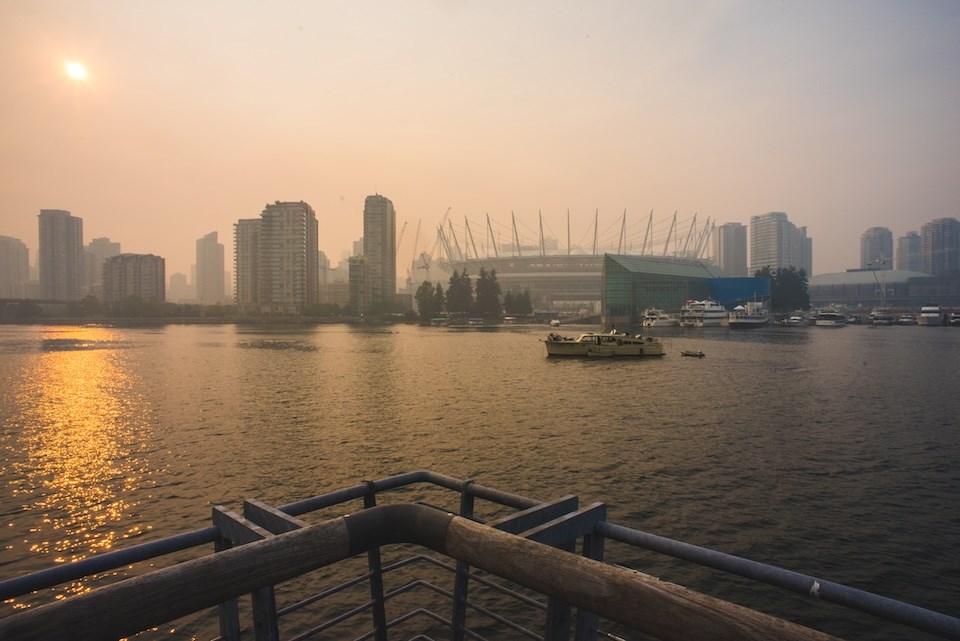Metro Vancouver Regional District has issued an air quality warning due to elevated fine particulate matter across the region.
The Lower Mainland, including Metro Vancouver and the Fraser Valley, are experiencing hazy conditions due to wildfire smoke combined with humid conditions on Wednesday, Sept. 3.
The department notes that the "wildfires contributing smoke to the region include those just east of Hope, near Whistler, and a large complex of fires in the Cariboo area, as well as fires in the United States."
Environment Canada meteorologist Matt Loney told V.I.A. that wind blowing from the Howe Sound was bringing smoke to Horseshoe Bay and parts of western Metro Vancouver.
An air quality warning for the region was issued not long after V.I.A. spoke with Loney, who had expected it would happen due to a weak outflow bringing increased smoke to the region.
"We have an upper ridge of high pressure in place anchored over B.C., so we have stagnant air, and not a lot of flow. It is putting a lid on pollution so it can't ventilate properly," he described.
Metro Vancouver weather forecast includes poor air quality
The smoke and humidity are creating an elevated fine particulate matter, which are "small particles in the air that may impact health," according to Metro Vancouver.
Smoke concentrations may vary across the Lower Mainland as winds, temperatures, and wildfire behaviour change. As smoke levels increase, health risks increase, meaning locals should limit time outdoors.
Environment Canada recommends people consider reducing or rescheduling outdoor sports, activities and events. They may experience mild and common symptoms such as eye, nose and throat irritation, headaches or a mild cough.
More serious but less common symptoms include wheezing, chest pains or severe cough. People who believe they are having a medical emergency must seek immediate medical assistance. People more likely to be impacted by outdoor air pollution, including people aged 65 and older, pregnant people, infants and young children, people with an existing illness or chronic health condition, and people who work outdoors, should reduce or reschedule strenuous activities outdoors and seek medical attention if experiencing symptoms.
Locals should keep windows and doors closed as much as possible. They can use a clean, good-quality air filter in their ventilation system and/or a certified portable air cleaner to filter fine particles. When outside, wearing a well-constructed, well-fitting and properly worn respirator-type mask (such as a NIOSH-certified N95 or equivalent respirator) can reduce your exposure to the fine particles in the smoke.
How long could the air quality warning last in Metro Vancouver?
Smoke is expected to become more widespread throughout the region by Thursday. Loney notes that the ridge of high pressure isn't expected to ease before the weekend, meaning any remaining smoke won't clear from the area.
"Until we get precipitation or wind––something significant––the ridge is in place in the forecast through the week and the beginning of the weekend," he explained.
Early next week, the ridge may weaken as an upper trough makes its way into the region. On Monday, there is an "increased chance of weather systems," although it isn't clear exactly how that will play out. It will produce higher humidity, cloud cover, and at least an onshore breeze. However, it "isn't the most vigorous system," Loney says.
Stay up-to-date with hyperlocal weather forecasts across 50 neighbourhoods in the Lower Mainland with Weatherhood.



